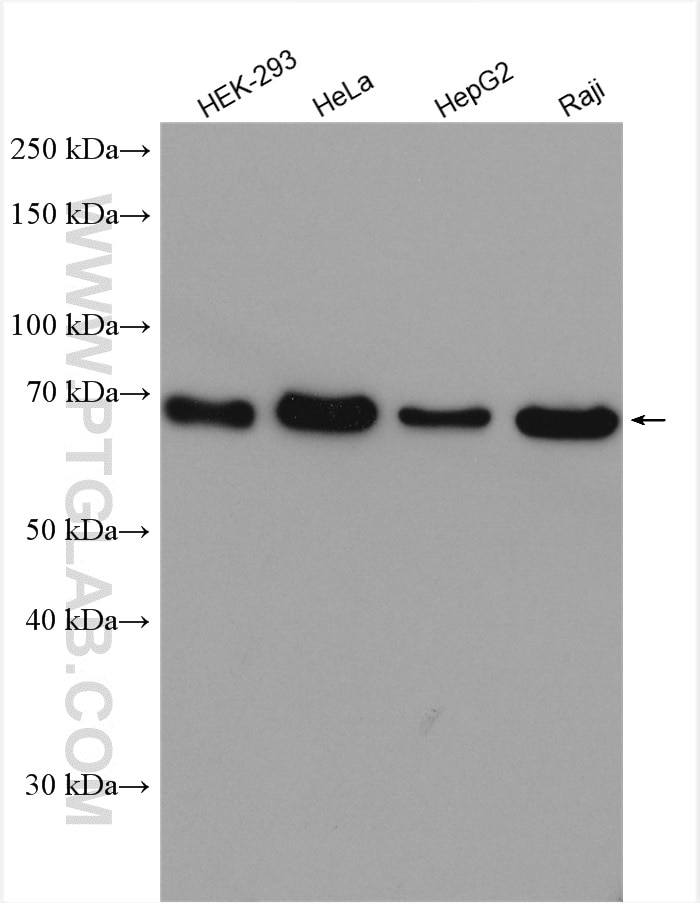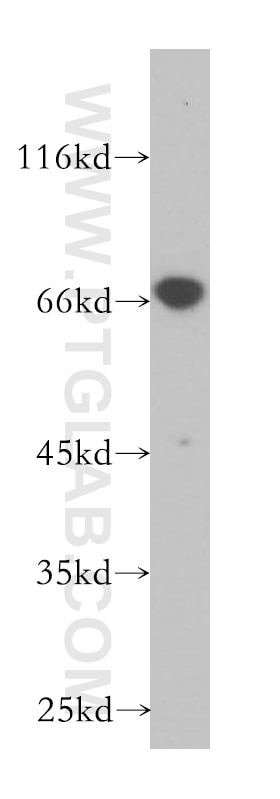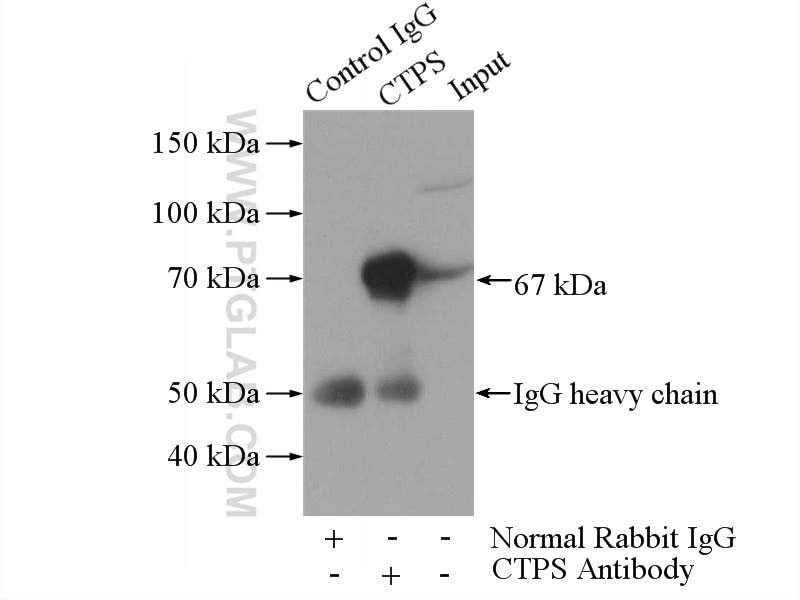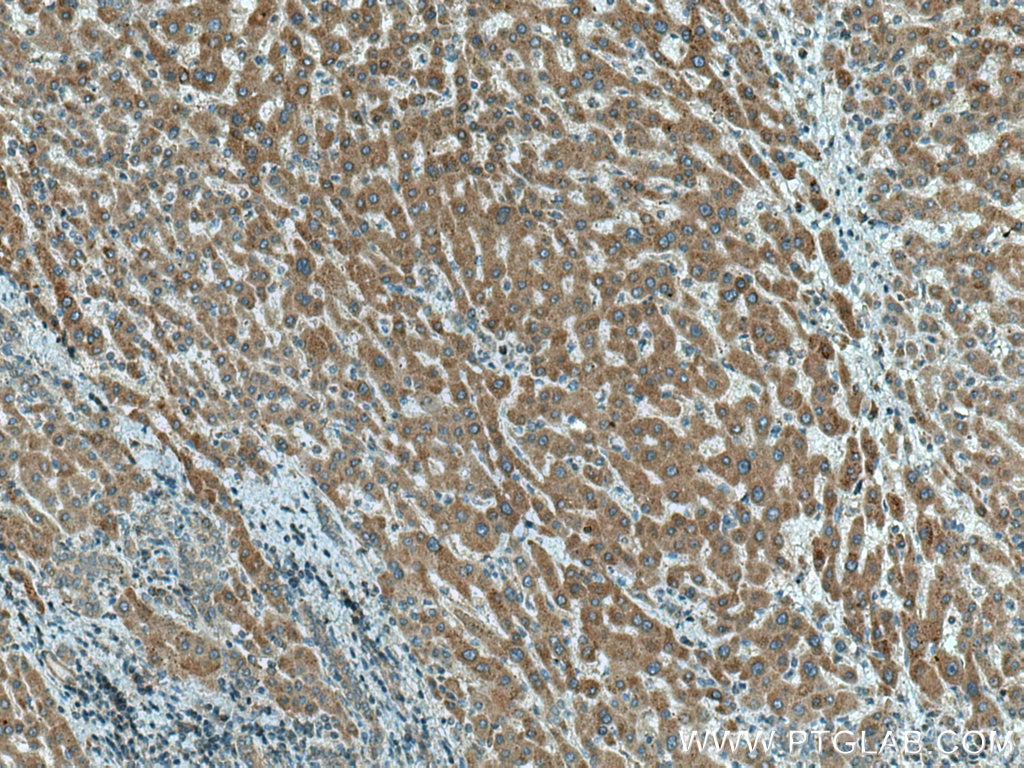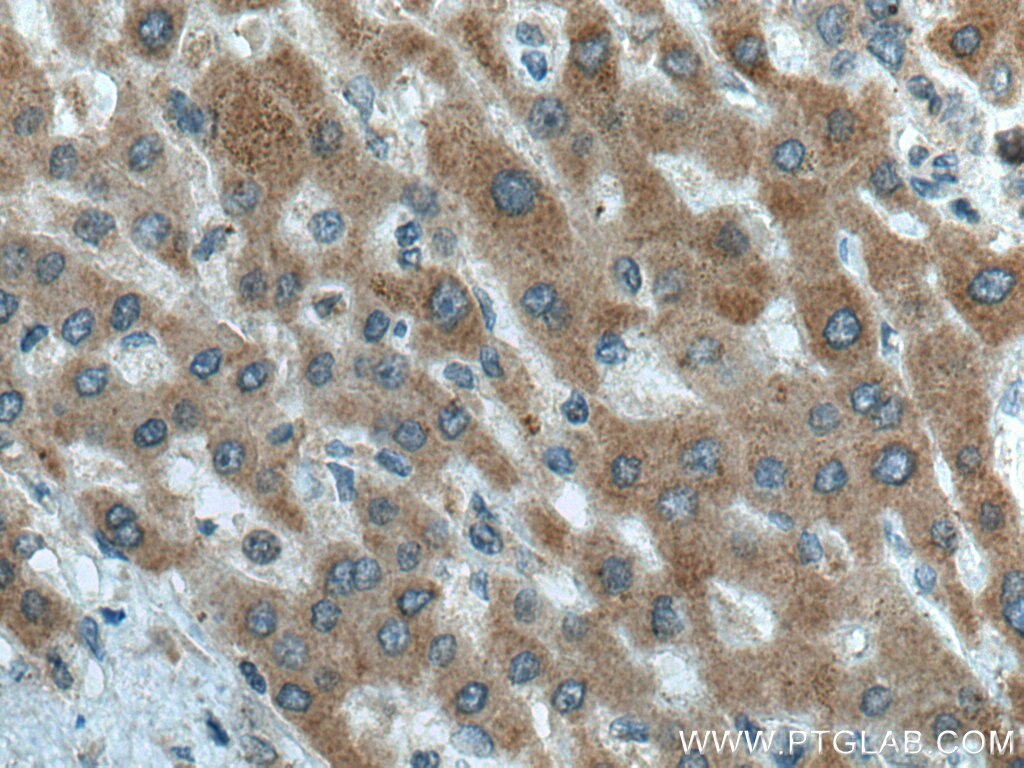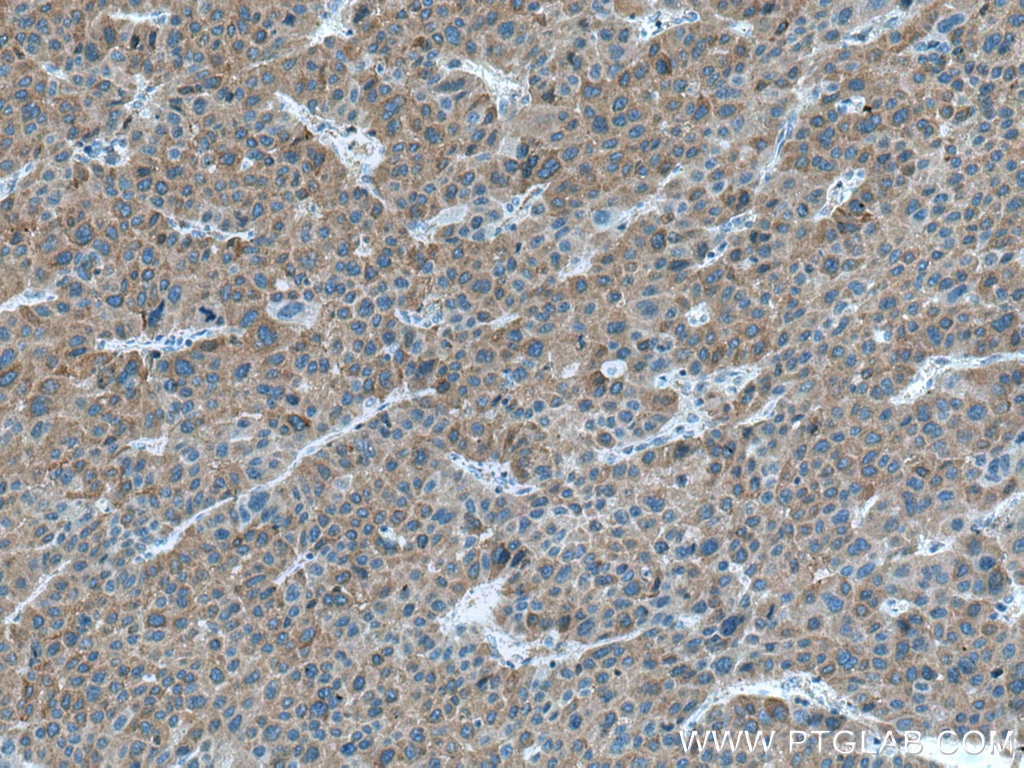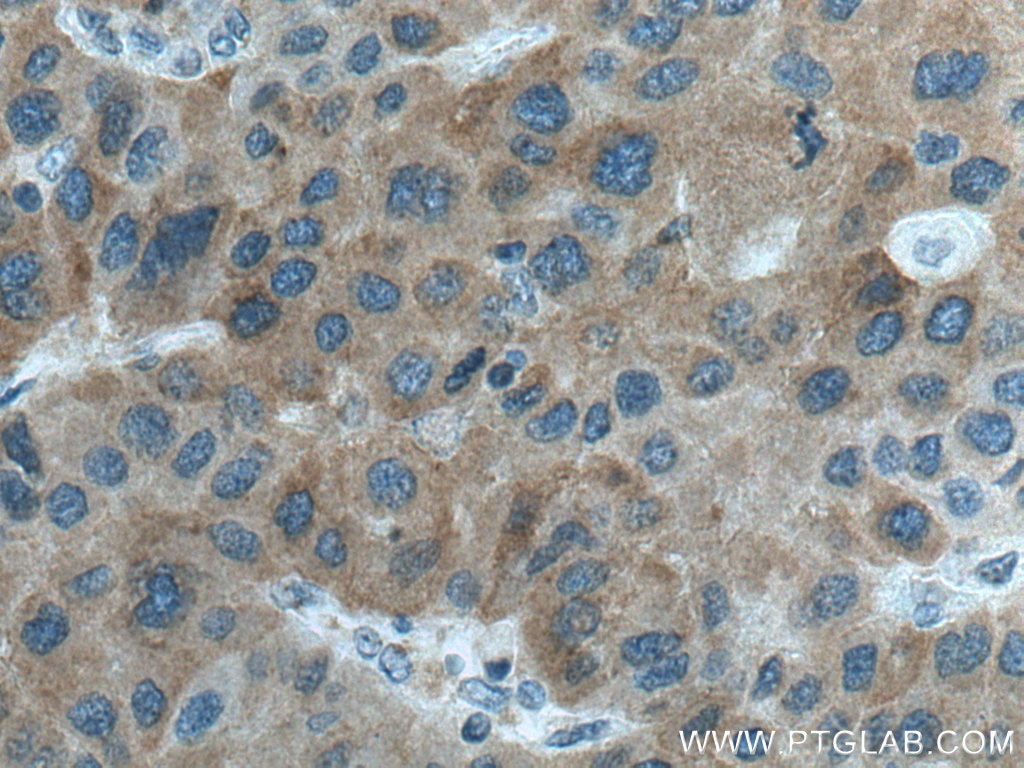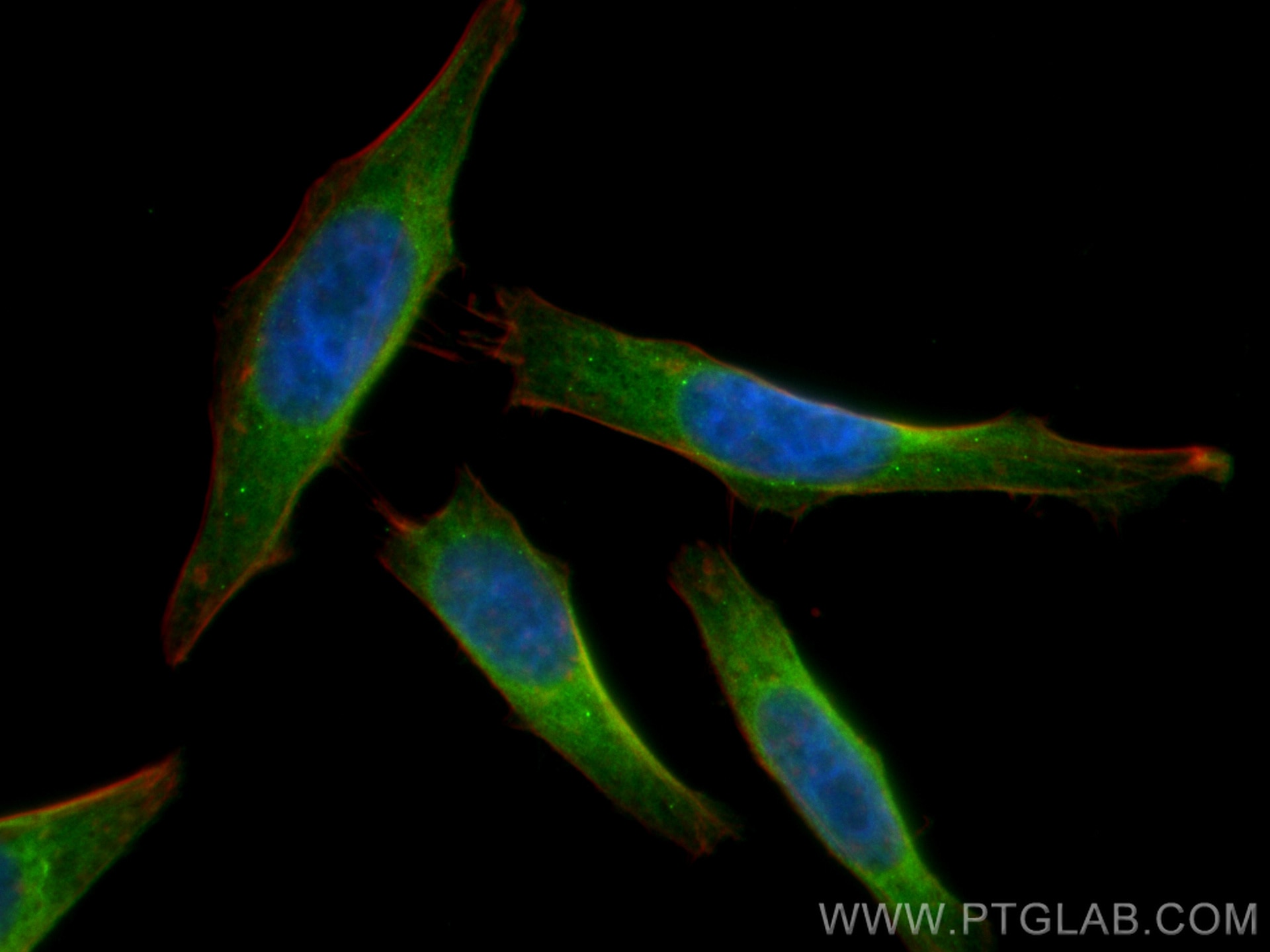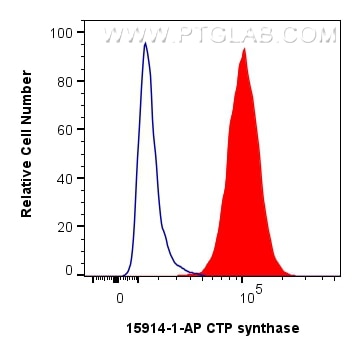- Phare
- Validé par KD/KO
Anticorps Polyclonal de lapin anti-CTP synthase
CTP synthase Polyclonal Antibody for WB, IHC, IF/ICC, FC (Intra), IP, ELISA
Hôte / Isotype
Lapin / IgG
Réactivité testée
Humain et plus (3)
Applications
WB, IHC, IF/ICC, FC (Intra), IP, CoIP, ELISA
Conjugaison
Non conjugué
N° de cat : 15914-1-AP
Synonymes
Galerie de données de validation
Applications testées
| Résultats positifs en WB | cellules HEK-293, cellules HeLa, cellules HepG2, cellules Raji |
| Résultats positifs en IP | cellules HeLa |
| Résultats positifs en IHC | tissu de cancer du foie humain, il est suggéré de démasquer l'antigène avec un tampon de TE buffer pH 9.0; (*) À défaut, 'le démasquage de l'antigène peut être 'effectué avec un tampon citrate pH 6,0. |
| Résultats positifs en IF/ICC | cellules HepG2, |
| Résultats positifs en FC (Intra) | cellules HepG2, |
Dilution recommandée
| Application | Dilution |
|---|---|
| Western Blot (WB) | WB : 1:1000-1:6000 |
| Immunoprécipitation (IP) | IP : 0.5-4.0 ug for 1.0-3.0 mg of total protein lysate |
| Immunohistochimie (IHC) | IHC : 1:50-1:500 |
| Immunofluorescence (IF)/ICC | IF/ICC : 1:50-1:500 |
| Flow Cytometry (FC) (INTRA) | FC (INTRA) : 0.40 ug per 10^6 cells in a 100 µl suspension |
| It is recommended that this reagent should be titrated in each testing system to obtain optimal results. | |
| Sample-dependent, check data in validation data gallery | |
Applications publiées
| KD/KO | See 3 publications below |
| WB | See 14 publications below |
| IHC | See 2 publications below |
| IF | See 12 publications below |
| IP | See 1 publications below |
| CoIP | See 2 publications below |
Informations sur le produit
15914-1-AP cible CTP synthase dans les applications de WB, IHC, IF/ICC, FC (Intra), IP, CoIP, ELISA et montre une réactivité avec des échantillons Humain
| Réactivité | Humain |
| Réactivité citée | Humain, Moustique, poisson-zèbre, souris |
| Hôte / Isotype | Lapin / IgG |
| Clonalité | Polyclonal |
| Type | Anticorps |
| Immunogène | CTP synthase Protéine recombinante Ag8707 |
| Nom complet | CTP synthase |
| Masse moléculaire calculée | 591 aa, 67 kDa |
| Poids moléculaire observé | 67 kDa |
| Numéro d’acquisition GenBank | BC009408 |
| Symbole du gène | CTPS |
| Identification du gène (NCBI) | 1503 |
| Conjugaison | Non conjugué |
| Forme | Liquide |
| Méthode de purification | Purification par affinité contre l'antigène |
| Tampon de stockage | PBS with 0.02% sodium azide and 50% glycerol |
| Conditions de stockage | Stocker à -20°C. Stable pendant un an après l'expédition. L'aliquotage n'est pas nécessaire pour le stockage à -20oC Les 20ul contiennent 0,1% de BSA. |
Informations générales
CTP synthase(CTPS) is also named as CTPS1 and belongs to the CTP synthase family. It catalyses the ATP-dependent formation of CTP from UTP using either L-glutamine or NH3 as the nitrogen source(PMID:12752439). It is important in the biosynthesis of phospholipids and nucleic acids, and plays a key role in cell growth, development, and tumorigenesis (PMID:8813694). CTP synthetase exists as a dimer in the absence of its substrates ATP and UTP, but in the presence of saturating concentrations of these substrates the enzyme exists as a tetramer.(PMID:18439916)
Protocole
| Product Specific Protocols | |
|---|---|
| WB protocol for CTP synthase antibody 15914-1-AP | Download protocol |
| IHC protocol for CTP synthase antibody 15914-1-AP | Download protocol |
| IF protocol for CTP synthase antibody 15914-1-AP | Download protocol |
| IP protocol for CTP synthase antibody 15914-1-AP | Download protocol |
| Standard Protocols | |
|---|---|
| Click here to view our Standard Protocols |
Publications
| Species | Application | Title |
|---|---|---|
Cancer Res Combined inactivation of CTPS1 and ATR is synthetically lethal to MYC-overexpressing cancer cells. | ||
J Cell Physiol Energy deficiency caused by CTPS downregulation in decidua may contribute to pre-eclampsia by impairing decidualization. | ||
Front Immunol Flow Cytometry Contributions for the Diagnosis and Immunopathological Characterization of Primary Immunodeficiency Diseases With Immune Dysregulation. | ||
Oncotarget Identification and validation of differentially expressed proteins in epithelial ovarian cancers using quantitative proteomics. | ||
J Cell Sci Rod and Ring formation from IMP dehydrogenase is regulated via the one-carbon metabolic pathway. |
